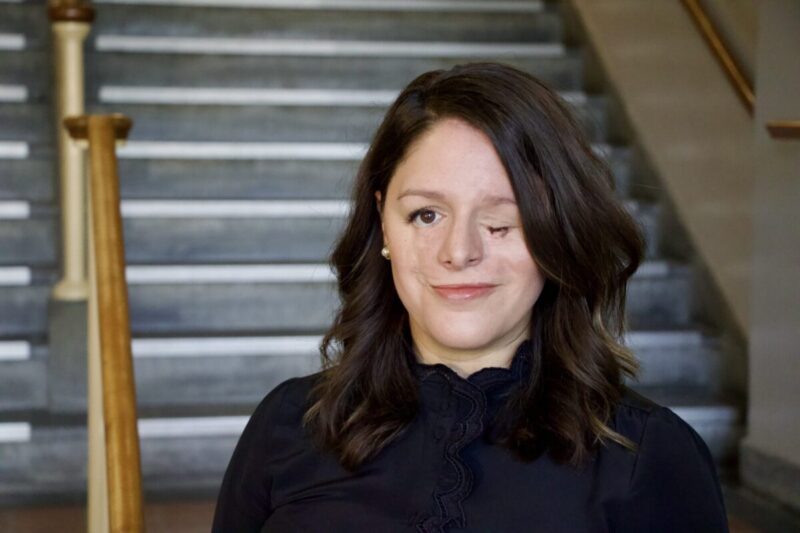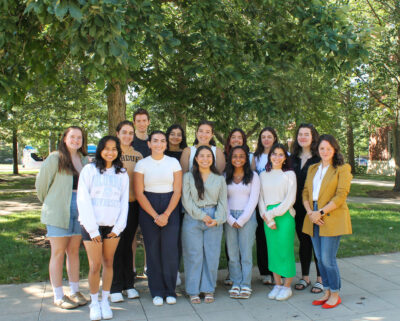Purdue Public Health researcher explores health technologies to reduce disparities for Hispanic, homeless populations
Written By: Rebecca Hoffa, rhoffa@purdue.edu

Natalia Rodriguez(Tim Brouk)
From the Hispanic community in Lake County, Indiana, to individuals experiencing homelessness in Greater Lafayette, Natalia Rodriguez, assistant professor in the Purdue University Department of Public Health, is working to advance health equity in communities throughout Indiana. By taking a community-based approach to increase access to preventive care and develop health technologies that detect disease early, Rodriguez’s research focuses on reducing cervical cancer rates among these vulnerable populations.
“While at the intersection of biomedical engineering, the bulk of my research is really public health-focused,” Rodriguez said. “It’s working with vulnerable communities to understand how health technologies could play a role in achieving health equity. (Hispanic and homeless populations) just happen to be two vulnerable populations in our state that have very high rates of women’s cancers.”
Rodriguez initially became interested in this line of work early in her career when she was working as a biomedical engineer in South Florida, exploring the high cancer rates in a population of Hispanic migrant farmworkers. Having developed and patented a rapid human papillomavirus (HPV) screening tool to detect the virus that commonly leads to cervical cancer, Rodriguez recalled believing her product could address the disparities they were experiencing. When it came time to implement the tool, the community wasn’t interested in using the technology, which led Rodriguez to dig deeper into the issues behind why they weren’t seeking health care.
“There were real, deep social barriers,” Rodriguez said. “They were undocumented and afraid. They had language barriers. They had a lot of misconceptions about cancer. There was a lack of health education, so they didn’t even want to talk about it because they associated it with dying. There were so many things that I was just totally unprepared to deal with as an engineer, and I realized technology alone is never going to be the answer. We have to understand the underlying social issues. That changed everything for me. It changed how I thought about technology development, how I thought about science and how I thought about my own career.”
Recently, Rodriguez’s work explored the barriers to health care in Lake County, which not only houses one of the largest proportions of Hispanic people in Indiana but also has one of the highest rates of cervical cancer incidence. Through working with community partners, such as Planned Parenthood and HealthVisions Midwest, Rodriguez’s team has found bringing health care to individuals through community health workers is useful in helping introduce vulnerable populations to the United States’ complicated health system.

Natalia Rodriguez (right) poses with her lab group.(Photo provided)
As they finish analyzing the data collected in Lake County, Rodriguez and two of her graduate students are currently working to scale their Lake County work to the Greater Lafayette area. They plan to explore how community health workers and innovations such as self-sampling methods for cervical cancer screening could help the local Hispanic population in Greater Lafayette as well as extend the work to individuals experiencing homelessness.
“All of those types of innovation for cervical cancer screening could be a great way to reach under-screened populations,” Rodriguez said. “We learned a lot of that working in Hispanic communities, and we think all of those innovations are actually super relevant and could be game-changing for homeless populations too.”
In bringing this work to homeless populations, Rodriguez noted it is a common misconception that people experiencing homelessness don’t prioritize their health because they’re focused on finding housing or dealing with other issues, such as substance abuse or poor mental health. Rodriguez’s research team found the opposite to be true.
“This population has been completely underrepresented in research and underprioritized because we assume their health is not as important to them as their homelessness,” Rodriguez said. “So, we’re learning that they want to take control of their health and want to access resources available to them. Empowering people experiencing homelessness to take health into their own hands and providing them with people they trust to help them navigate a very complicated health system and the resources available to them is a huge return on investment because they will avoid a lot of those other issues later.”
Rodriguez noted her work closely aligns with the College of Health and Human Sciences’ Sustainable and Thriving Communities and Organizations research area, which has allowed her to develop strong partnerships within the college in addition to the local community partners she works with, including Lafayette Transitional Housing Center and the YWCA Greater Lafayette.
“Through all of our work, we’re trying to help our community partners and these vulnerable communities thrive and sustain a lot of the programs they’re trying to implement,” Rodriguez said.
With a courtesy appointment in biomedical engineering, Rodriguez also works closely with Jacqueline Linnes, Marta E. Gross Associate Professor of Biomedical Engineering in the College of Engineering, to create health technologies that will be beneficial to vulnerable populations.
“Natalia has been a fantastic collaborator,” Linnes said. “Her deep understanding of the biomedical technology development process, alongside her passion and expertise in equitable access to health for underserved communities, is incredibly beneficial in our joint projects. Natalia’s community engagement allows laboratory-focused researchers like myself to find out what the real needs are among stakeholders and to design for those specific settings knowing the constraints and strengths of the users of these technologies.”
Ultimately, Rodriguez plans to expand her research beyond cervical cancer to improve health outcomes for vulnerable populations by facilitating preventive care delivery more broadly.
“That’s where we’re taking it next, with cervical cancer really just serving as a model for any other form of preventive health care,” Rodriguez said. “Our long-term goal is to have a broad model for primary and preventive health care in general in homeless shelters as a way to really leverage that window of opportunity where we can reach these vulnerable individuals.”
On Oct. 3, 2023, Rodriguez was awarded the NIH Director’s New Innovator Award. Read the announcement.